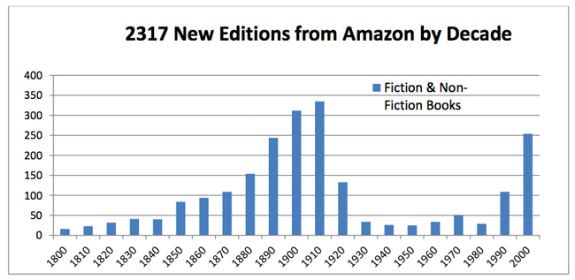How Can Somebody Who Loves Culture Possibly Defend The Copyright Monopoly?
- September 29, 2013
One of the most perplexing accusations that are thrown at me and other copyright monopoly critics is that we “hate culture”. This is not just weird in a Westboro-Baptist-Church kind of way (“if you don’t subscribe to our dogma, you must hate our way of life, freedom, liberty, and fluffy kittens too”), but it is also completely at odds with reality.
It is precisely because I love culture, knowledge, and freedom of expression that I relentlessly criticize the copyright monopoly. It is the biggest inhibitor of creativity by a wide margin in today’s society, according to pretty much every single piece of research that wasn’t funded by the copyright industry itself.
Let’s focus on two areas today: availability of culture and compensation to artists.
In the first area, we can observe that there is more culture available than ever today, not because of the copyright monopoly, but despite it. People create like never before, despite the fact that it is often illegal to do so. Fortunately, most people-be-artists have a deep and healthy disrespect for this monopoly construct that would prevent them from making culture: 100 hours of video are uploaded to YouTube every minute. That’s 6,000 times more than realtime upload. That means people-be-artists are creating programming today for 6,000 worldwide TV channels that run 24-by-7, just for one video site. Most of it is illegal by today’s copyright monopolization.
But it gets worse. When you look at the culture available through the old system based on the copyright monopoly, you find that there’s a huge black hole in our culture heritage where it’s not interesting to publish culture that’s a few decades old. It’s only when the copyright monopoly expires that the culture becomes available again through new publications. There is a cultural black hole of the copyright monopoly that takes away upwards of 90% of our culture from the 1900s. This was clearest illustrated by Paul J. Heald who did research on the catalog of Amazon Books, and found that books that are 20 years old mostly aren’t available anymore, not until the copyright monopoly expires – 90% of our culture vanishes because of the copyright monopoly:
Image credit: Paul J. Heald / The Atlantic

The second objection to copyright monopoly reduction or abolition tends to be “how shall the artists get paid”. This objection is bordering on obscene coming from somebody who defends today’s order based on the copyright monopoly, where 99% of artists don’t get signed by a big publisher, and of those who do, less than 0.05% ever see any royalties. (These numbers come from the recording industry, but based on experience, it is safe to assume that book publishing see similar numbers.)
Today’s system based on the copyright monopoly ensures that 99.995% of struggling artists are never paid a cent. How can somebody who claims to love culture possibly defend that system?
What today’s system does, though, is to enrich the parasitic middlemen inherent in the system – the vested interests who fraudulently claim to “speak for artists”, but in reality, are robbing them blind (stories of how these parasitic middlemen publishers have been outright stealing the rest of the money from those last 0.005% of artists are almost an everyday occurrence).
So in summary, the copyright monopoly prohibits would-be-artists from making culture, it prevents art and culture from reaching the public, it isolates artists from their fans, it prevents artists from getting money for their art, and it ensures that 90% of modern culture dies a premature death. This construct can only be defended by people who claim to love culture if they are afflicted by a religious-grade denial of rational thought.
It’s time to take the bull by the horns and challenge the copyright monopolists on this core issue, whether they actually care for culture at all. The copyright monopoly kills culture and artistry, and that’s a known fact backed up by hard data.



No comments:
Post a Comment